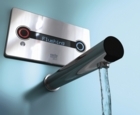Non-touch water control for healthcare

Rada’s Acu digital thermostatic mixing valve is specifically designed to provide non-touch-controlled hand-washing facilities for the total range of healthcare applications. The enhanced aesthetics of Acu helps de-institutionalise the hospital environment and deliver improved hand hygiene, water control and management.
Acu is a stylish concealed digital mixing valve for washbasins. It offers programmable maximum, minimum and default temperatures. It also has duty-flush and thermal-disinfection capabilities (important for legionella control), complemented by temperature logging and data logging.
The spout and controls are inset into proprietary wall-panel systems and can be accessed, programmed and maintained without having to demount the panels.
There is infra-red, non-touch operation for on/off and temperature adjustment. Simple programming allows the selection of timed flow control and fixed or adjustable temperature.
Temperatures can be pre-set in three fixed modes — clinical, patient and surgical, within DO8 guidelines — or for free use up to a maximum of 48°C through secure programming.
The spout is the key to activating the product and comes in two lengths to meet the needs of ‘Health technical memorandum 64’. It has an adapter to support the installation of Pall-type water filters.








